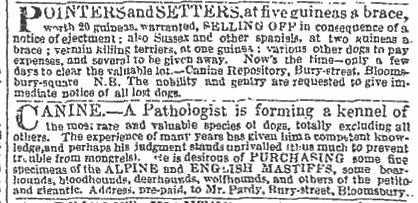DOGS. — Important Notice. — The Proprietor of the Canine Repository, Bury-street, Bloomsbury-square, has the honor to announce to his patrician supporters, that in consequence of an arrangement with a noble duke his retirement will not take place this season, and that he has now on SALE the most splendid KENNEL of DOGS, of every species extant. Country orders supplied. Letters to the keeper. Immediate notice is requested of all lost dogs.

That ad will repeat verbatim on January 27.
Yet if Pardy did actually have some special arrangment with a nobleman, it sure didn't last long, for the following ad appeared on February 13, 1843, in
The Times and definitely suggests Pardy's financial situation is getting grimmer:
DOGS. — Public Notice. — In consequnce of a continuation of ejectment the proprietor of the Canine Repository, Bury-street, Bloomsbury-square, finding that he cannot longer uphold, has at length finally determined to SELL OFF all his valuable STOCK of DOGS at ruinous prices, solely to pay law expenses, the keep, and keeper's wages. N. B. The registry office open as usual for the recovery of lost dogs.

Pardy, in serious financial straits by this point, has to relocate his "Canine Repository," as the following ad in
The Times for March 22, 1843, indicates:
DOGS, of Fashion and Character. — The most splendid KENNEL in Europe, petit and gigantic, comprising about 100 brace of every species extant. Menageries and country and shipping orders supplied. Canine Repository, Bury-street, Bloomsbury-square, removing to the Blue Lion-yard, Gray's-inn-road. N.B. The Public Registry Office is open daily, as usual, for the recovery of lost dogs, of which all losers should give immediate notice.

This new address is quite close to Pardy's previous locations, less than half a mile or so. "Blue Lion-yard" refers, I believe, to property associated with the Blue Lion pub (in existence since at least 1805 and still a going concern) located on Gray's Inn Road.
In ad in
The Times of April 7, 1843, Pardy announces, with his customary rhetorical flourishes, that the relocation of the Repository has taken place:
DOGS of FASHION and CHARACTER. — The proprietor of the canine repository, Bury-street, Bloomsbury, takes leave to announce to his patrician supporters that he has finally REMOVED to those desirable, airy, and matchless premises, the Blue Lion-yard, Gray's-inn-road, where the nobility and gentry are supplied as usual. N.B. The register office for the recovery of lost dogs, of which immediate notice should be given to the keepers. Country orders supplied.

An ad in
The Times of May 20, 1843, implies business as usual at the new location although Pardy has in fact filed for bankruptcy protection by this point. Also of note here is that the ad referes to "keepers," plural, though again that may just be Pardy using the "royal we."
DOGS on SALE. — Public Notice. — Removal. — The Canine Repository and Register Office for the recovery of Lost Dogs is removed from Bury-Street, Bloomsbury, to the Blue Lion-yard, Gray's Inn-road, where the nobility and gentry are supplied with every species of fashion and character extant. Orders should now be booked for sporting dogs, as 10 braces weekly are arriving from Yorkshire, all warranted. Letters to the keepers, and give immediate notice of all lost dogs.

Yet a mere 5 months later, the Repository is relocating again. From the October 10, 1843, edition of
The Times comes an ad in which Pardy claims to be "the original repositorian," although from what I can tell
Pardy took over the Repository from T. Wilton, so this claim may be inaccurate:
DOGS EXTRAORDINARY. — The original canine repositorian, late of Bury-street, Bloomsbury-square, having returned from the continent with Cerberus the giant dog of the Alps, begs to announce he has resumed his official duties, and is REMOVING his matchless KENNEL to No. 23, stables, opposite the Running Horse, Davies-street, Berkeley-square, where every species of canine is on sale. The only register-office for the recovery of lost dogs, which are instantly traced. Letters to the keeper.

This location is a little more than a mile and a half from Pardy's previous location in the Blue Lion Yards; in other ads Pardy will refer not to the Running Horse but to "Davies-mews, Davies-street." I believe that is the same location as in the ad immediately above. (The Running Horse tavern has been in existence since 1738 and continues to this day in the same location on Davies Street in the Mayfair district of London.)
Pardy placed an ad in
The Times on May 1, 1844, which indicates he has moved yet again but is still selling dogs; that ad can be seen
near the bottom of this page here at The Cultured Newf.
Another ad, placed in
The Times on May 7, 1844, makes no mention of any specific breeds, and indeed implies that he is now more of a dog broker than a direct seller.
DOGS found and DOGS on SALE. — The original canine repositorian and projector of the celebrated register office, from Bury-street, announces his return to Whetstone-park, Lincoln's-inn-fields, where he undertakes to find all lost dogs in town or country, and where also every species, petit and gigantic, is always on sale. 100 couple of beagles, hariers [sic], and foxhounds at a day's notice. Letters to the manager, at home daily from 10 to 6, the first stable from Great Turnstile.

This location is about a quarter of a mile from several of Pardy's earlier addresses — he's back on very familiar ground. The above ad repeats verbatim on May 8 and 9, 1844.
I have found no further advertisements in
The Times that I can be completely certain were published by Pardy, but there is the following: some of the published legal notices regarding his bankrupty identify him as living in "Portland-place". At about the same time (1844), some advertisements appear in
The Times from an unidentified person selling dogs from a Portland Place address, and making pains to point out his exemplary character.
Here is one of those ads, from
The Times of September 2, 1844, in which the keeper not only remarks on his character but indicates he is in search of a job:
DOGS, Pointers and Setters. — A keeper having high testimonials of character, and good conduct, and a reference in town, has for SALE some highly broken POINTERS and SETTERS, warranted in every respect, and possessing all the requisites necessary for a true sportsman. On view at Cavendish-mews north, Charlotte-street, Portland-place. Trials allowed, and the keeper also wants a place.

Could that be Pardy? Sure, but it could also be someone else, perhaps someone new to London looking for work. Several advertisements from September of 1845 (the 11th and the 17th) offer dogs for sale and also mention that the keeper is looking for a "place." The latter of those ads identifies the seller as "F. Martlew." So the above ad is likely not Pardy.
As an aside, Pardy was not the only London dog seller to more-or-less vanish from the pages of
The Times: by the mid 1840s, advertisements of dogs for sale, by both commercial sellers and private individuals, became much less frequent.
 ADULTERY TRIAL
ADULTERY TRIAL
As if matters couldn't get any more tangled or sordid.... Pardy appears, in a personal rather than professional sense, in
The Times again in 1845 (though, as you can see below, his name also appeared in various London legal newspapers regarding his filing for bankruptcy in 1843), and when Pardy
does return to
The Times, it's a doozy: he is named in an adultery case. Whether or not he was actually the person who claimed, in this matter, to be Pardy the dog seller, is uncertain.
This case, Clowes v. Clowes, was heard on April 15, 1845; the account in
The Times was published the next day. The lawsuit sought to annul a marriage on the grounds of fraud and adultery, the husband alleging that his mistress-turned-wife had both misrepresented her identity and then bore a child which she falsely claimed was his. The wife, in turn, alleged desertion and cruel treatment, harassments of various sorts that left her so poor that she was "driven, or rather entrapped. . . into the commission of adultery with a person who went by the names of Cooper, Pardy, and Godfrey, and who kept, or was connected with, a place for the sale of dogs, called the Canine Repository, in Bury-street, Bloombsbury-square." The report does specifically note the "suspicious conduct" of Mrs. Clowes, who was only 21 when this matter transpired, "in receiving the visits of an elderly gentleman, who made her presents, and was once admitted into her bedroom." The judge, remarking also that there was no evidence Mrs. Clowes ever suffered from destitution, found in favor of the husband and granted the divorce.
Was the "elderly gentleman" J. S. Pardy, or someone using his identity? He was not called as a witness in the trial, so it is impossible to know for sure.
 BANKRUPTCY PROCEEDINGS
BANKRUPTCY PROCEEDINGS
Pardy's fortunes certainly seemed to be on the wane, his stable-work, dog-selling and dog-rescuing activities apparently bearing no fruit, for he filed for bankrupty, as per the following legal notice published in a London legal newspaper,
The Jurist, on May 13, 1843:

A brief legal notice in
The Spectator, May 13, 1843, shows Pardy, "Gray's Inn Road, dog dealer" declaring insolvency on May 12.
The following appeared in another London paper that published legal proceedings, the
London Gazette for May 16 of that year:
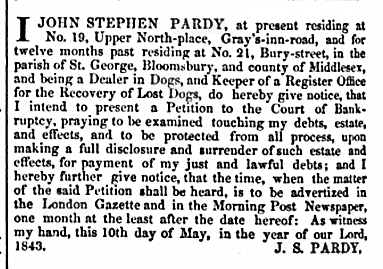
And this, from another London legal publication:
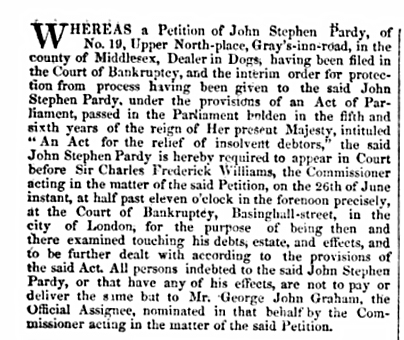
Another notice appeared in
The Law Times for Saturday, May 20, 1843, in which it seemed Pardy attempted, unsuccessfully, to have his debts cleared:
The insolvent, a dog dealer, applied for his final order, and was opposed on several grounds.
An application was made on the part of the insolvent, by Mr. Woodruffe, to alter a debt stated in the schedule in order bring the debts under 300£. An adjournment was asked to prove that the debt was capable of alteration, and it was that other commissioners had allowed amendments.
EVANS, C., said he should not allow such an alteration, as it might be resorted to in all cases when insolvents found themselves opposed. — Petition dismissed, on the ground of being a trader in dogs owing more than 300£
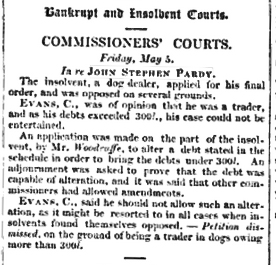
Similar notices appeared in other London newspapers and legal journals in May and June of 1843.
On July 8, 1843, a notice appeared in
The Law Times noted that Pardy was given 3 months to try to resolve matters with his creditors:

A notice in
The Jurist for December 30, 1848, reported that Pardy was ordered to appear in court on January 12, 1849:
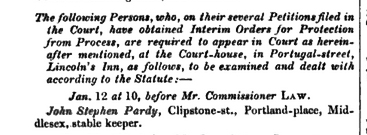
A very similar notice — some of the language is legal boilerplate — had appeared in
The Times two days earlier; it provided a little more information regarding Pardy's current residence and occupation: "27, Clipstone-street, Portland-place, carrying on business at 3, Conway-mews, Hampstead-street, Fitzroy-square, both in Middlesex, stablekeeper and commission agent for the sale of horses."
On the morning of January 12, 1849,
The Times carried a brief item listing those who were appearing in "Insolvent Debtor's Court" that day; Pardy is among those listed, appearing at 10am.
On April 2, 1849, a brief note appears in
The Times regarding Pardy's hearing being adjourned:

Pardy's situation seems to have bottomed out, for he was later imprisoned for debt (a common practice in Britain at the time, not abolished until 1869), as the following legal notice from the
London Gazette (January 23, 1849) makes clear:
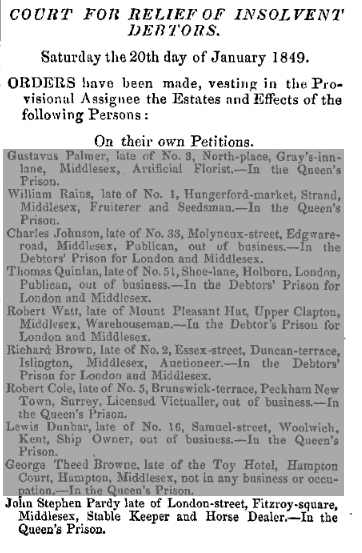
I have been able to find no further information about Pardy.








